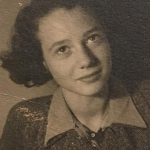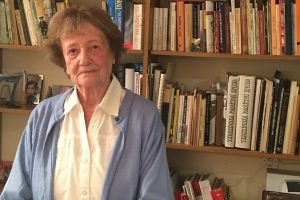 Just imagine living in a place where owning or even borrowing a book could get you, and anyone who gave you a book, killed. During the Holocaust, the Jews and other nationalities and religious groups who didn’t fit in with the Aryan race, were considered non-people, and therefore expendable. They were not allowed to live like normal people. They were considered “expendable.” Their lives were not worth the trouble it took to care for them, even their fiends and neighbors were expected to turn them over to be deported to the ghettos and even killed. They were often powerless to help themselves. Still, most of them never lost hope. When the Nazis began to occupy Czechoslovakia in 1939, the persecution of the Jews began almost immediately. Things were hard for everyone, but the children were often in more peril than anyone else. Many were to young to work and that made them even less “important” to the Nazis. To make matters worse, they were often separated from their parents…everything they knew was stripped from them.
Just imagine living in a place where owning or even borrowing a book could get you, and anyone who gave you a book, killed. During the Holocaust, the Jews and other nationalities and religious groups who didn’t fit in with the Aryan race, were considered non-people, and therefore expendable. They were not allowed to live like normal people. They were considered “expendable.” Their lives were not worth the trouble it took to care for them, even their fiends and neighbors were expected to turn them over to be deported to the ghettos and even killed. They were often powerless to help themselves. Still, most of them never lost hope. When the Nazis began to occupy Czechoslovakia in 1939, the persecution of the Jews began almost immediately. Things were hard for everyone, but the children were often in more peril than anyone else. Many were to young to work and that made them even less “important” to the Nazis. To make matters worse, they were often separated from their parents…everything they knew was stripped from them.
In 1942, when a girl named Dita Polachova was 13 years old, she and her parents were deported to Ghetto Theresienstadt life got even worse than it was before. Later they were sent to Auschwitz, where Dita’s father died. She and her mother were sent to forced labor in Germany and finally to a concentration camp called Bergen-Belsen. Dita’s mother died at Bergen-Belsen. Even in the face of so much sadness in her life, Dita never gave up. She risked her own life to protect a selection of eight books smuggled in by prisoners of Auschwitz. She stored the books in hidden pockets in her smock, and circulated them to the hundreds of children imprisoned in Block 31. Books were forbidden for the prisoners in the camps. The Nazis didn’t want them to have any knowledge of the outside world, or access to any kind of education materials or any books. The Nazis believed that none of these people were going to survive their stay in the camps anyway, so they didn’t need to do anything but work and die.
The prisoners had different ideas. Within the walls, there was a family camp known as BIIb. It was a place where the children could play and sing, but school was prohibited. Nevertheless, the Nazis were not able to enforce their will on the people. In spite of the orders of the Nazis, Fredy Hirsch established a small, yet influential school to house the children while their parents slaved in the camp. The materials were the biggest problem. The books, had to be hidden from the Nazi guards at all costs. Hirsch selected Dita, a brave and independent young woman from Prague to take over as the new Librarian of Auschwitz in January of 1944. Dita was a brave girl, who took her responsibility seriously.
While her parents are trying to stay alive in Auschwitz, Dita was fighting her own battle to preserve the books that bring joy to the children in the camp. The books are one of the few things that allow the children to escape from the walls in which they are surrounded, even if just for a moment. As the war progresses, Dita continues to diligently serve the teachers and children of Block 31. Then, Dita’s situation grew much worse. Her father passed away in the camp due to pneumonia. Dita and her mother are left alone to fight the battle on their own. Dita’s mother is grew weaker with age, and Dita knew she had to assume more responsibility. Dita is aware of the fact that the camp is simply a front to produce Nazi propaganda. She began to fight despair, as she struggles to feel the value in her life. By March 1944, the feeling of hopelessness grows. The Nazis announce that the inmates who arrived in September will be transferred to another division, which is really code for  murder. The BIIb continued until they heard that the Nazis are going to liquidate the family camp and separate the fit to work from the rest. Dita’s mother Liesl, was grown old and very weak by now. She was able to sneak into the group that is fit to work along with her daughter, narrowly. They were sent to the Bergen-Belsen concentration camp. Just when Dita gets to the point where she feels this might be the end, the Allied forces liberate the camp, but it is too late for Dita’s mother, who died just after the English arrived. Dita is now free, but it has been at great cost…the kind most of us cannot begin to comprehend. Dita later met and married Otto Kraus, an author, and they settled in Israel where they were both teachers.
murder. The BIIb continued until they heard that the Nazis are going to liquidate the family camp and separate the fit to work from the rest. Dita’s mother Liesl, was grown old and very weak by now. She was able to sneak into the group that is fit to work along with her daughter, narrowly. They were sent to the Bergen-Belsen concentration camp. Just when Dita gets to the point where she feels this might be the end, the Allied forces liberate the camp, but it is too late for Dita’s mother, who died just after the English arrived. Dita is now free, but it has been at great cost…the kind most of us cannot begin to comprehend. Dita later met and married Otto Kraus, an author, and they settled in Israel where they were both teachers.


Leave a Reply